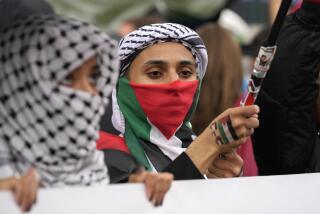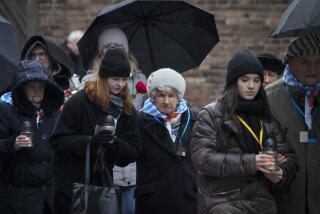Spain Honors Train Victims
- Share via
MADRID — With church bells and candles, silence and prayers, Spain on Friday offered solemn memorials to the victims of one of Europe’s deadliest terrorist attacks, one year after bombs detonated by Islamic militants ripped through commuter trains during morning rush hour.
The violence on March 11, 2004, traumatized this country and opened a new phase of terrorism in the heart of Europe, the impact of which is still being felt throughout the continent.
Politically divided but eager to move forward, Spaniards marked the anniversary with restraint and dignity.
At noon, traffic came to a halt, motorists stepped from their cars, trains stopped and workers left their offices, all part of a silent tribute to the victims.
King Juan Carlos I and Queen Sofia silently inaugurated a grove of olive and cypress trees in Madrid’s Retiro Park.
There were 192 trees: 191 for the people killed in the bombings and one for a security agent killed later when seven suspects in a suburban apartment blew themselves up as police closed in.
The royal family was joined by King Mohammed VI of Morocco in a gesture of solidarity and cooperation. Most of the suspects in the attacks were Moroccans.
At 7:37 a.m., the time last year when the first of 10 explosions destroyed four crowded trains, more than 600 churches tolled their bells Friday in and around Madrid.
At the Atocha station, where many of the victims were killed, hundreds of commuters shared the platform with journalists and television cameras there to record the moment.
Lighted red candles were set up as a memorial, along with a handful of written messages, white carnations and a few photographs of those killed.
“I can’t shake the thought,” said Patricia Diaz Doran, 28, who had been at the station last year and returned Friday. “Today is just another day, but I feel nervous. You can’t help but look around you.”
Spanish SWAT teams patrolled the area.
A few commuters wiped away tears, and many appeared subdued as they boarded their trains.
“I’m sorry for what happened,” said 41-year-old Saida Boussikouk, a Moroccan immigrant wearing a hijab, or head scarf, and taking in the scene as she ascended an escalator on her way to work.
The attack “wasn’t right, but neither is it right to blame us all,” she said.
“People push me in the subway when they didn’t before, I can tell the difference.... Fortunately, most people are still good with me,” she said.
“The problem is that more people than ever before don’t like seeing us here.”
After dark, Spain’s Roman Catholic bishops led the royal family, authorities and others in a eulogy Mass.
The city’s largest mosque also offered prayers for the victims.
In addition to the nearly 200 people killed -- a quarter of them immigrants from 16 countries -- an estimated 1,800 people were injured, some of whom are still struggling to recover.
Many victims’ support groups chose not to participate in the ceremonies held Friday, saying they did not want to publicly relive their pain.
The government, which came to power in an upset victory three days after the bombings, and others argued that the grief is a national one, coming from an indelible and collective trauma.
Spaniards are keen to show their resilience in the wake of the attacks. But the discomfiting realization lingers that their country, widely seen as tolerant, was a target and remains one.
Olga Sanchez, the prosecutor leading the judicial investigation into the bombings, said the perpetrators had planned a “continuous and broad campaign of violence,” including attacks on a school, synagogue and courthouse.
Many of those attacks were prevented by the suicides of some suspects and the arrests of 75 others, officials believe.
But judicial officials said this week that key suspects remained at large and had the potential to strike.
“The objective of our investigation is to go all the way to the end in terms of finding out who thought up, plotted and executed these acts, and only then will we be finished,” Sanchez said.
The first trials might not be held until a year from now, she added.
Times staff writer Wilkinson reported from Rome and special correspondent Moffett from Madrid.
More to Read
Sign up for Essential California
The most important California stories and recommendations in your inbox every morning.
You may occasionally receive promotional content from the Los Angeles Times.














